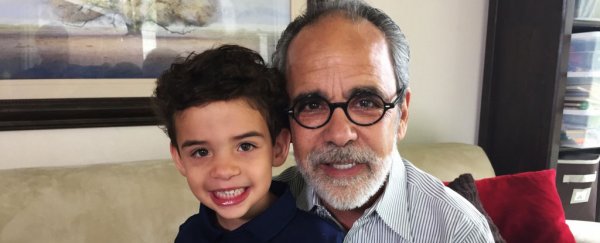When retired judge Howard Broadman realised his four-year-old grandson would one day need a life-saving kidney transplant, he realised he had to do something.
The problem was, by the time his young grandson, Quinn, could receive a transplant, Broadman would be too old to donate his own kidney. So he came up with a unique workaround, which researchers say has now helped save the lives of almost 70 people.
It wasn't a complex idea he came up with, but was in fact quite brilliant in its simplicity.
In 2014, Broadman, then 64, approached physicians at the UCLA Kidney Transplant Program and made them a one-of-a-kind request: if he were to donate one of his kidneys to a stranger who needed it immediately, could Quinn receive a 'voucher' for when he needs his own transplant in the future?
The doctors Broadman approached were receptive to the idea, and so began a unique kidney donation program that addresses one of the key issues in getting vital organs into the bodies of recipients: when supply and demand don't coincide.
 UCLA Health
UCLA Health
"Some potential kidney donors are incompatible with their intended recipient based on blood type; others may be incompatible based on time," explains urologist Jeffrey Veale from UCLA, the surgeon who performed Broadman's transplant.
"The voucher program resolves this time incompatibility between the kidney transplant donor and recipient."
Broadman may have been the first donor to give over one of his kidneys in return for such a voucher, but he certainly wasn't the last.
In a new study, Veale reports on how the voucher system – which has now rolled out to 30 transplant centres across the US – triggered chains of donations that contributed to 25 successful transplants.
Approximately one in three patients can't be paired with donated kidneys from friends or family members due to reasons of biological incompatibility.
When this happens, doctors try to match up transplants between donors and recipients that don't know one another but whose physiology looks to be compatible. These transplant queues are called 'chains'.
But there's another problem. Sometimes donors might want to hold onto their organs in case a compatible loved one could make use of it later, even if it's not needed now (kind of like Broadman's situation, except his case was further complicated by his age).
This is where the voucher system comes in. By encouraging donors to part with their organs right away, it helps get kidneys to patients who require them immediately, removing one of the disincentives to altruistic donation.
In return, donors aren't assured a kidney in the future – as that won't always be practical or possible – but they do get the next best thing: prioritised matching for their designated recipient with a compatible donor in a future transplant chain.
Veale's study describes how three initial voucher cases including Broadman's ended up triggering 25 transplants, but the actual impact of the scheme is even greater – with a total of 21 kidney vouchers so far being given out, leading to 68 transplants once the organ supply chain was freed up.
It's an amazing start to the initiative, which the researchers say could ultimately make a huge difference to the lives of the 93,000 people currently awaiting kidney transplants in the US.
"If only a fraction of the 40 million chronic kidney disease patients in the US had a donor like Judge Broadman, then tens of thousands of high-quality organs would enter the system," Veale told New Scientist.
"For the first time in history we could actually start reducing the waiting list."
One of the patients on that list will be Quinn, who's now seven years old.
By the time he's old enough to receive a transplant in several years, hopefully the waiting list will be significantly shorter than it used to be, thanks to his grandfather's bright idea.
In any case, he'll have his voucher – and maybe something else on his side too.
"If Quinn had needed the kidney right away, I was going to donate my kidney," Broadman explained to CNN.
"But once he didn't need it right away, I thought, why not pay it forward and maybe karma would come about."
The findings are reported in Transplantation.
